- Home
- Courtney Milan
The Carhart Series Page 43
The Carhart Series Read online
Page 43
One hayrick. Two. The sun moved a good slice in the sky, until Ned was past the point of tiredness, past the point of shoulder pain, until his muscles burned and he wanted nothing more than to set down the pitchfork and leave the work to the men Plum would undoubtedly send.
But he didn’t. Because not only did this bleed off all that extra intensity, this was good practice. While there were days like today, when he felt vigorous and invincible, there also came times when he wanted nothing more than to simply come to a halt.
Those were the poles of his life: too much energy, almost uncontainable, followed by too little. When the next pole came riding ’round, he’d be ready for it again.
For now, though, he pitched hay.
Chapter Five
KATE FOUND HER HUSBAND’S COAT carelessly tossed across a fence rail. She’d trudged down a muddy footpath in search of him. The trail meandered behind a short scrubby line of trees, past an old, weathered line of fence. In the distance, ducks gabbled peacefully.
By the time she found him, her dress, once pristine, had picked up a band of mud at the hem. The starch of her collar had become limp against her skin. Not quite the way she’d wanted to confront her husband.
He, on the other hand… Ned had stripped to his shirtsleeves. His dark waistcoat hung open. He was wielding a pitchfork with the deft efficiency of a farmhand. Beneath the unbuttoned waistcoat, she could see the loose folds of his shirt swinging in time to his work. He had no cravat. A moment’s search found that white length of cloth draped near his coat.
The other gentlemen of her acquaintance would have looked foolish, without the armor of their clothing to hide thin shoulders, or the bulge of their bellies. But Ned had an air about him, not of disorder, but of casual confidence. Perhaps it was the self-assured rhythm he’d adopted. That uncivilized swagger suited him.
He had never seemed dangerous before he left, and she felt no fear now. And yet there was something different about him. Too casual to seem arrogant; too controlled to come off as happy-go-lucky. He’d changed.
He had a touch of the carefree ruffian about him even now, when he thought nobody was watching but a solitary, skittish horse. Champion huddled on the opposite end of the pasture, ears plastered against his head.
Ned was friends with Harcroft. He’d been the one to introduce the man to Lord Blakely and his wife. Anything he discovered—and as her husband, Ned had the legal right to discover a great deal from Kate—would ruin all of her carefully laid plans. He was already ruining her plans. He had unquestioningly taken the side of Lord and Lady Blakely. He had ushered Harcroft in with hospitality. And he would want to know—quite reasonably, he would think—how his wife spent her time. His presence would impede Kate’s ability to communicate with Louisa. How could she see to her friend’s safety if she couldn’t even visit her?
No. Even if he didn’t know it himself, her husband was a danger to her. The slightest word to him, carelessly spoken, could be repeated. In the blink of an eye, Louisa could be exposed.
He was dangerous in a more subtle way, too.
Five minutes of conversation, and she could still feel the mark his finger had left on her chin. Her hand bore an invisible imprint, where he’d laid his atop it. Five minutes, and he’d stirred her to laughter.
He had not heard her approach, and so she had the chance to watch him. He finished moving the last of the hay into the cart and set the pitchfork down slowly. He stripped off his leather gloves, one by one, then pulled off the waistcoat and laid it on the tongue of the cart, next to the gloves and his cravat. Then he stretched and took a clay jug off the cart. Instead of drinking from it, though, he held it above himself and poured a thin stream of water over his head.
His hair, already glistening from exertion, matted to the sides of his head. His white shirt turned translucent and clung to his chest.
Oh, heavens. Kate’s breath stopped. The intervening years had been very kind to him. Fabric adhered to defined muscles—not thick, like a laborer’s, but lean and rangy, like a fencer’s.
It was abominably unfair that he should leave for years and come back looking like that.
She felt the glorious unfairness of it bite deep in her chest.
Kate was not the only one watching. Some twenty yards distant stood the animal he had impetuously purchased today. The servants must have seen to it, because someone had transformed the beast from bedraggled to…slightly less bedraggled. The harness had been removed, and its dull coat had been brushed. Those small hints at grooming underscored how far the animal had yet to come. There were hollows where the animal should have sported muscle and worn spots where the ill-fitting harness had rubbed skin bare.
Ned was not talking to the animal, not even in the low, gentle tones he’d used earlier that morning. For that matter, he didn’t act as if he was even aware that it stood so many yards distant. Instead, he picked up his discarded waistcoat and patted its pockets, as if searching for something. He plucked out a little sack and walked away.
The horse—Champion, Ned had called the beast—watched him warily, turning sidelong to keep one eye on him as he walked. Ned whistled tunelessly and peered off into the distance, out at the short, scrubby stretch of trees that blanketed the nearby hill. Just as casually, he began tossing a tiny object from hand to hand. Kate caught a glimpse of white as it danced back and forth a few times, before he lobbed it off into the yellowing grass. He threw it with a sidelong motion, as if he were skipping a stone on the sea of shorn stubble.
Kate took two steps closer, her hands closing on the fence rail.
Champion’s nostrils flared at Ned’s sudden movement. He backed away, hastily. Ned turned from the horse. As he did, he caught sight of Kate. He stopped dead, and the small smile he’d been wearing slipped away. He didn’t say a word. Instead, he walked back to the cart. Once there, he donned his waistcoat and then his cravat, pulling the cloth around his neck. He tied the knot with grave finality. Then he advanced on her.
Behind him, Champion laid his ears back in dire warning to any predators that might attack. He stamped his feet—once, twice. Then he trotted forward, lowered his head, and lipped up whatever Ned had thrown at him.
Ned still hadn’t said anything. But as he came upon her, he put his hand in that sack again. He set another object on the fence post in front of him. In the sunlight, the thumb-sized object gleamed like a lump of white porcelain.
“Come,” he said to Kate. “Walk with me.”
Kate’s corset seemed to tighten. Hot lines of whalebone pressed into her ribs while she tried to draw in a pained breath. Some trick of the light made his eyes appear darker, almost black; by contrast, the afternoon sunlight tinted his brown hair halfway to gold.
Shaving had revealed the strong line of his jaw. But he could still have used a valet’s services to trim his hair. The ends, still dripping water, curled into his eyes. Slowly, he lifted one hand and brushed those strands back.
It struck her as monstrously unfair. When Kate’s hair fell into her eyes, it looked blowsy. On her husband, the untidiness seemed nonchalant and approachable. And yet, if she were to approach him with the truth of what she’d done…
When they’d married, she’d thought he had an essential sweetness to him, a kindness. Perhaps that was why she had agreed to marry him. Marriage was a frightening business for a woman; one never knew what one’s husband might do. The man she’d married would never have condoned what Harcroft had done to his wife.
But this man? It had looked as if he had left a white rock atop the post. But as she walked up to it, the object he’d left shone innocently up at her. Her husband might have been careless and thoughtless, but he had never been cruel. A man who fed a wary horse—she sniffed the air delicately—peppermints was not the sort of man to make her fear for her safety.
So he was still sweet. But back then, he’d been sweet like a meringue—all froth and sugar, no substance. Now…
She walked after him, her fingers tappi
ng a worried percussion against the rough wood rail of the fence. He stopped ten yards away, on the opposite side of the fence. A few thin strips of wood. Not really much of a barrier.
Kate took a deep breath. “I see you’re coddling the horse again.”
He let out an amused snort of air. “Someone has to.”
She couldn’t look at him. If she did, she might stare at the way his shirt plastered to his biceps, might think of that wet fabric under his waistcoat, clinging to his abdomen.
She might imagine—oh, drat. She was. Kate turned into the wind, hoping the breeze would cool her flaming cheeks.
She sniffed and set her foot on the wooden stile that traversed the fence. It was composed of an ingenious set of narrow, wooden steps, placed so that humans, but not cattle, could clamber across on agile feet. Still, she felt as graceless climbing those narrow strips of wood as if she were an ox. A well-laced corset and heeled half boots, set with jet buttons, were all well and good in a drawing room. They weren’t made for scaling fences.
When she reached the top, she glanced down at her husband. His gaze was not fixed on her face, as would have been proper. He stood too straight, his eyes caught on that bare strip of ankle revealed by her movement. The moment lasted just long enough for him to blink and look up. He offered her his arm; she took it.
As if he hadn’t looked at her legs. As if she hadn’t looked at him, either. When her heels wobbled on the last step, he steadied her; and when she stood beside him, he looked away. So did she. Her gaze settled on the horse. It lifted its head and stared at her, its ears tilting forward. Some women of her acquaintance had practically grown up on horseback; Kate had been thrown once when she was younger, and the broken leg she’d nursed had left her somewhat shy of the animals. Her father had once explained to her what that particular tilt of the ears meant. It was either horse language for I am very hungry, or the equine equivalent of Help, a wolf! Now, which one was it?
“Don’t look at him.” Ned’s voice was deep, right beside her.
“Why ever not?” She kept her voice light, to disguise the flutter in her stomach.
“Because he’s nervous.”
Help, a wolf! it was. She looked away—but her eyes caught on her husband, and she felt her stomach contracting. She quickly looked back to Champion. Twenty yards away, the horse peeled his lips back. She caught a glimpse of yellowing teeth.
“He’s going to think you’re challenging him.” Ned sounded amused. But the alternative to looking at Champion was looking at her husband.
“Maybe I am,” she teased. “I should like to be lady of this pasture. I should reign over the goats in spring, and the straw in winter.” And I would command you to move piles of hay in your shirtsleeves. Daily.
“You may reign over as many goats as you wish, if you just—oh, damn.”
Across the field, Champion stamped. Kate had only a second to realize how serious the situation was before the animal charged toward them. Hooves pounded against turf. She didn’t think he would actually trample her, but before she could turn and scramble over the stile, Ned had picked her up for the second time that day, and swung her over the fence. She landed, awkwardly, and grasped the fence rail to keep from crumpling to the ground.
He vaulted lightly after her, and then turned to face her.
Champion’s charge came up short, and the horse let out what sounded to Kate’s ear like a very self-satisfied whinny.
“I take it back,” Kate said, catching her breath. “He may rule all the goats.”
When Ned had swung her over, she’d twisted to face away from the pasture. Her husband had landed catlike next to her, and as Champion came close, he stepped nearer, his body pressing her against the fence rail. He didn’t seem angry; he merely smiled at her.
“I suppose you think I’m very foolish.” She spoke softly; Champion was just behind her.
“What? Because you challenged a creature twice as strong as you and five times as fast?” Kate flushed.
“Not foolish in the least,” he said, peering into her eyes.
“No?”
“You weren’t in any danger. I was there. I wouldn’t have let anything happen to you.”
Kate froze, unable to breathe. He stood so close to her, scarcely six inches away. Every breath she took narrowed that distance between them by a finger’s breadth. His gaze dropped to her bodice, to the high neck of her ivory walking dress. She felt as if he could see through the lace collar, as if she were the one wearing translucent fabric.
Help. A wolf.
He was impossibly close. To him, she’d always been a wife. And she’d learned all too well what it meant to be a wife. She was to engage in delicate charity and complex embroidery. She was a figure to be trussed up in a corset and petticoats, to be protected when necessary and indulged when not. A lady did not get her hands dirty. Kate had learned that all too well from her parents.
She wondered what Ned would say if she told him she’d arranged Louisa’s escape. If he would even believe her capable of that much, or if he imagined that she was as frivolous—as superfluous—as Harcroft had said.
She could hear the animal’s breath behind her. She had never realized that a solitary horse could breathe so loudly.
“Why isn’t he going?” She pitched her voice low, but even she could hear the desperation in her words.
Ned did not move his eyes from her. “I don’t know. I think he can smell the peppermints in my pocket. Here.”
He moved his hand slowly, slowly to his waistcoat pocket; then, just as agonizingly slowly, he pulled it away. His hand was close enough to brush her cheek.
He tossed another candy, throwing it far off into the grass.
She could not see the horse. She heard only its breathing. No tentative footfalls signaling its departure. Nothing. She could imagine Champion, warily scenting the wind, considering whether to put its back to its enemies.
Ned winked at Kate, and her toes curled.
“I don’t dare move,” she confessed.
“Really?” He gave her a naughty smile. “I can think of a dozen ways in which I might use that to my benefit.”
Kate swallowed. If she’d been reluctant to move before, his words rooted her in place now. Her half boots seemed to be made of thick iron. Her arms were bound at her side. Her mind filled with all the wicked things he might do to her. He might kiss her. He might run his hand down her side. He might undo those mother-of-pearl buttons at her neck and peel back the lace at her bodice.
He looked in her eyes. That old, heady desire swirled through her. A breeze eddied between their bodies, and she felt its caress as if it were his. His eyes narrowed, oh so subtly. He leaned forward.
Maybe this was why she had come here, danger or no danger, plan or no plan. She needed to assure herself that on some basic, primeval level, Edward Carhart still thought of her as his wife. To see if he would treat her as carefully, as gentlemanly, as before.
Champion moved away. Kate felt an elusive brush of wind against the nape of her neck, a wisp of air turning to nothing. Then, the clop of hooves.
“There,” Ned said. He had not dropped his gaze. Her lips tingled; her skin seemed too tight. He was going to kiss her. And foolishly, after three years of absence, she still wanted him to try. She wanted to believe he would attempt to revitalize their phantom marriage. She wanted to put her hands on the rough, wet fabric of his shirt, to feel the skin beneath. She wanted a taste of his carefree casualness, some indication that he thought of her as more than a delicate duke’s daughter. She wanted to believe he felt something for her, even if it was an emotion as evanescent and fleeting as desire. She bit her lip in an agony, waiting for him to move forward.
Instead he pulled away. “There,” he declared again. “Now you’re free to leave.”
Leave. She could leave? She stared at his profile in disbelief. After he’d practically pinned her to a fence post and joked he could use her twelve ways—after all that, he thought she could
leave before he tried even one of them?
She bit her lip, hard. She could taste copper salt on her tongue. She could finally breathe now—and her breath seemed heated to fury.
“I can leave?”
He didn’t look back at her. His hands were balled at his sides.
“I can leave? And here I thought that was what you were best at.”
He flinched and looked back at her. “I was trying to be a gentleman.”
“I think,” Kate said, “you are the most obtuse man in all of Christendom.”
“Possible, but unlikely.” He gave her an apologetic shrug. “There are a great many Christians, and a good number of them are idiots. If there were not, Britain would never have gotten into a war with China over the importation of opium.”
She kicked at his boot—not hard, but enough to vent her frustration in physical form. “If I want to speak in hyperbole, I am going to do it. And don’t believe you can stop me with irrelevant political analysis. It’s neither sporting nor gentlemanly.”
“Trust me,” he said wryly, “right now, all I can think about is being a gentleman. It taxes my brain to think of anything except my gentlemanly duties.”
He swallowed and glanced down her neck. It was almost as if he’d never left, as if they were three months into their marriage. As if she were the one yearning forward, while he held himself back in polite denial.
“I retract my statement.” Her voice shook. “You are not the most obtuse man in all of Christendom.”
“No, no. You were perfectly right. The lady of the pasture always retains the right to hyperbole. Use it with my blessing.”
“There’s no need,” Kate said. “I’ve realized that I am the most obtuse woman.”
That finally brought his gaze flying from her bodice to her eyes.
She’d come out here to see if there was any substance to this marriage of theirs, to ascertain if he could accept a wife who took on unladylike pursuits. But she was still susceptible to him after all these years. And despite his informal attire, he still treated her as if he were the consummate gentleman.

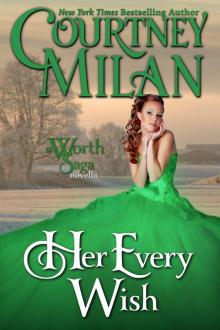 Her Every Wish
Her Every Wish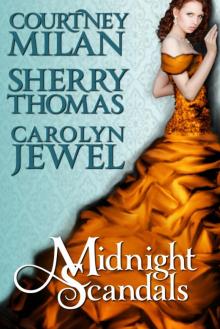 Midnight Scandals
Midnight Scandals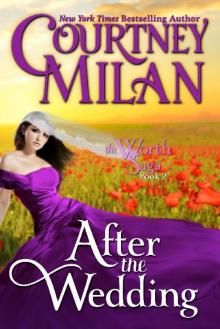 After the Wedding
After the Wedding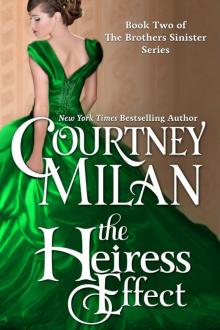 The Heiress Effect
The Heiress Effect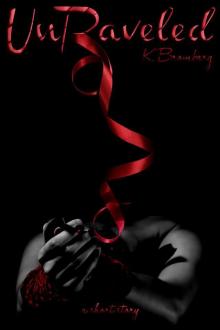 Unraveled
Unraveled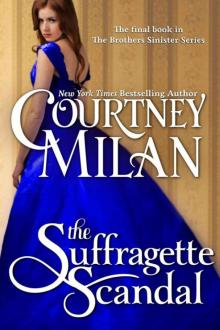 The Suffragette Scandal
The Suffragette Scandal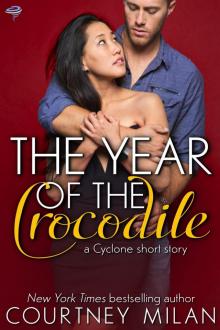 The Year of the Crocodile
The Year of the Crocodile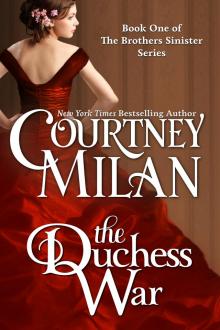 The Duchess War
The Duchess War What Happened at Midnight
What Happened at Midnight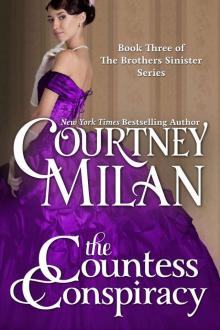 The Countess Conspiracy
The Countess Conspiracy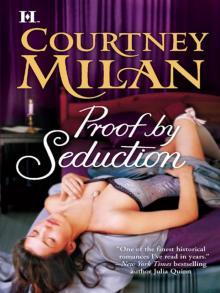 Proof by Seduction
Proof by Seduction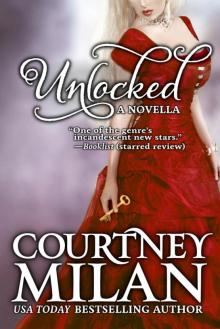 Unlocked
Unlocked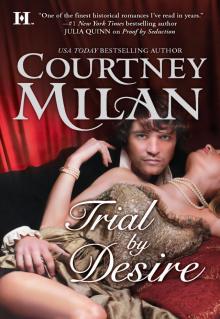 Trial by Desire
Trial by Desire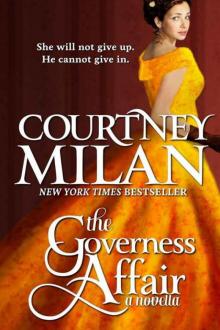 The Governess Affair
The Governess Affair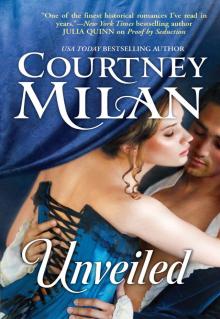 Unveiled
Unveiled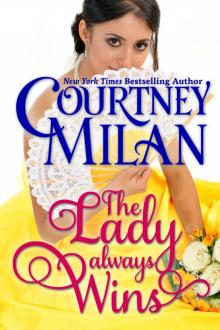 The Lady Always Wins
The Lady Always Wins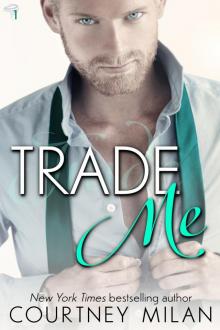 Trade Me
Trade Me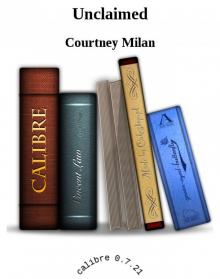 Unclaimed
Unclaimed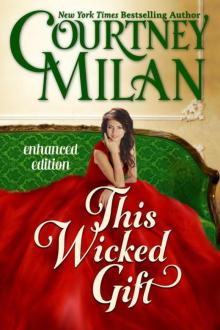 This Wicked Gift
This Wicked Gift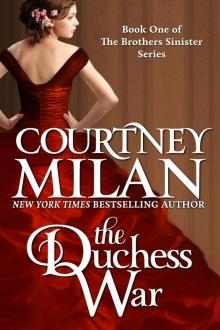 The Duchess War (The Brothers Sinister)
The Duchess War (The Brothers Sinister)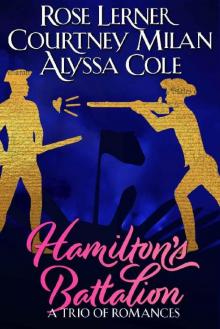 Hamilton's Battalion: A Trio of Romances
Hamilton's Battalion: A Trio of Romances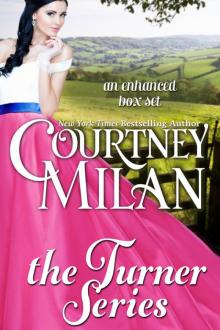 The Turner Series
The Turner Series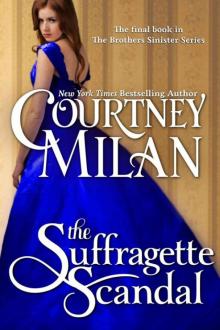 The Suffragette Scandal (The Brothers Sinister)
The Suffragette Scandal (The Brothers Sinister)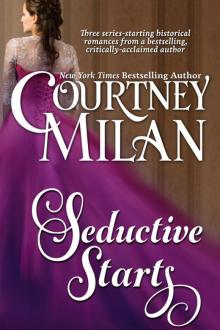 Seductive Starts
Seductive Starts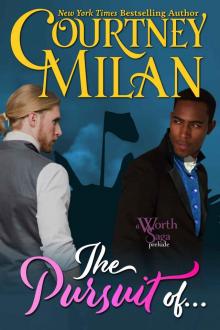 The Pursuit Of…
The Pursuit Of…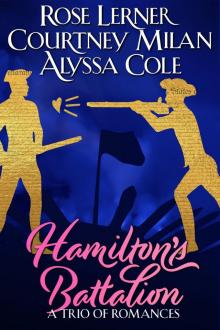 Hamilton's Battalion
Hamilton's Battalion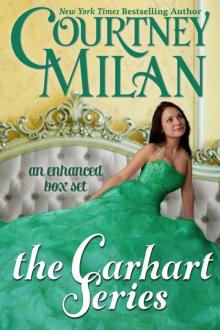 The Carhart Series
The Carhart Series Seven Wicked Nights
Seven Wicked Nights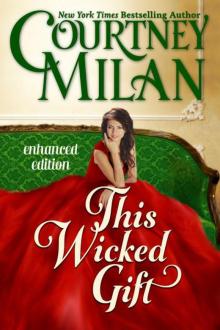 This Wicked Gift (A Carhart Series Novella)
This Wicked Gift (A Carhart Series Novella)